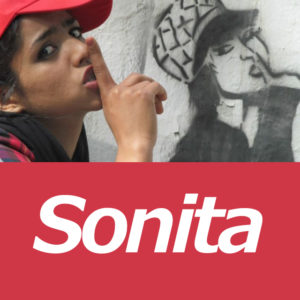Sundance Award-winning and Spirit Award-nominated Iranian documentary filmmaker Rokhsareh Ghaemmaghami is no stranger to the politics of immigration. Born in Tehran, when her latest feature documentary “Sonita” appeared in the Edge Documentary Festival in New Zealand in Spring 2016, Ghaemmaghami was initially denied entry to the country on the grounds immigration “found insufficient ties between her and her country [Iran].” After an international outcry, Immigration New Zealand changed its stance and ultimately issued her a visa. But Ghaemmaghami’s issues with visas and immigration authorities were not over.

Announced in November 2016 as a Film Independent Spirit Award Nominee for Best Documentary for “Sonita”, it was always her intention to travel to the United States for the awards ceremony in Santa Monica in February 2017. Then Donald Trump was elected President of the United States and on January 27, 2017, issued Executive Order 13769, titled “Protecting the Nation from Foreign Terrorist Entry into the United States”. Given Ghaemmaghami is from Iran, she was effectively banned from traveling to the United States for the awards. Along with Ghaemmaghami, several Oscar-nominated filmmakers also found themselves in similar situations.
Thanks to the ruling of the Ninth Circuit, Executive Order 13769 was temporarily stayed, thus opening the door for Ghaemmaghami to attend the Spirit Awards this past Saturday. However, even with the stay, it was not an easy road obtaining a visa for entry into the United States. “It was an interesting experience. First, we were banned. All those countries were banned. I was thinking, ‘Okay. I’m not going to go.’ I didn’t have a good feeling about it. I was hearing all these stories.”
Reconciling herself to the fact she would not be able to attend the Spirit Awards, a ceremony celebrating “independent spirit”, it was the American people who turned the tide for Ghaemmaghami. “[W]hen I saw so much solidarity and so much resistance by the American people and then the federal court and the judiciary system of America, I found my feelings back. It’s not the whole America that wants this ban.” With a glint in her eye, she chuckled that it was ultimately Trump’s Twitter posts that were the final bit of encouragement she needed to try to make the trip. “He was so angry that the ban is gone. I said, ‘Okay. Now I’m coming! If it really makes you so mad, I am coming!’.”
Merely because the ban was stayed, however, did not mean obtaining a visa would be easy. As Ghaemmaghami tells it, there are still forces at play seemingly obfuscating legitimate efforts for entry into the United States. “Some US embassies didn’t give me an appointment. . . One gave me an appointment. It was not easy to get an appointment. And I know other filmmakers who couldn’t get an appointment.”
But once she obtained her visa, there was still the actual travel. “I was very nervous about my arrival. I called my friends. They were in the airport with lawyers. I was so nervous about being checked and [the authorities] getting all of my information and social media.” Luckily, there were no further hurdles. “My arrival was very smooth. Nobody asked me even a single question. . .It was surprising, surprisingly easy.”

Happy, at ease and excited to finally be on the Spirit Awards signature blue carpet, Rokhsareh Ghaemmaghami calls her journey from making of the film to nomination to the beach in Santa Monica to be “one of my best experiences.” When asked what she will take away from the Spirit Awards, she was reflective. “I don’t know what I will take home from being at the Independent Spirit Awards, but always I am more touched by how people receive my movies; ordinary people. When they have shown this movie in many refugee camps in Europe, that was my best experience of making the movie. When you reach the people who need to see a movie and you change their lives, it’s the best experience.”












